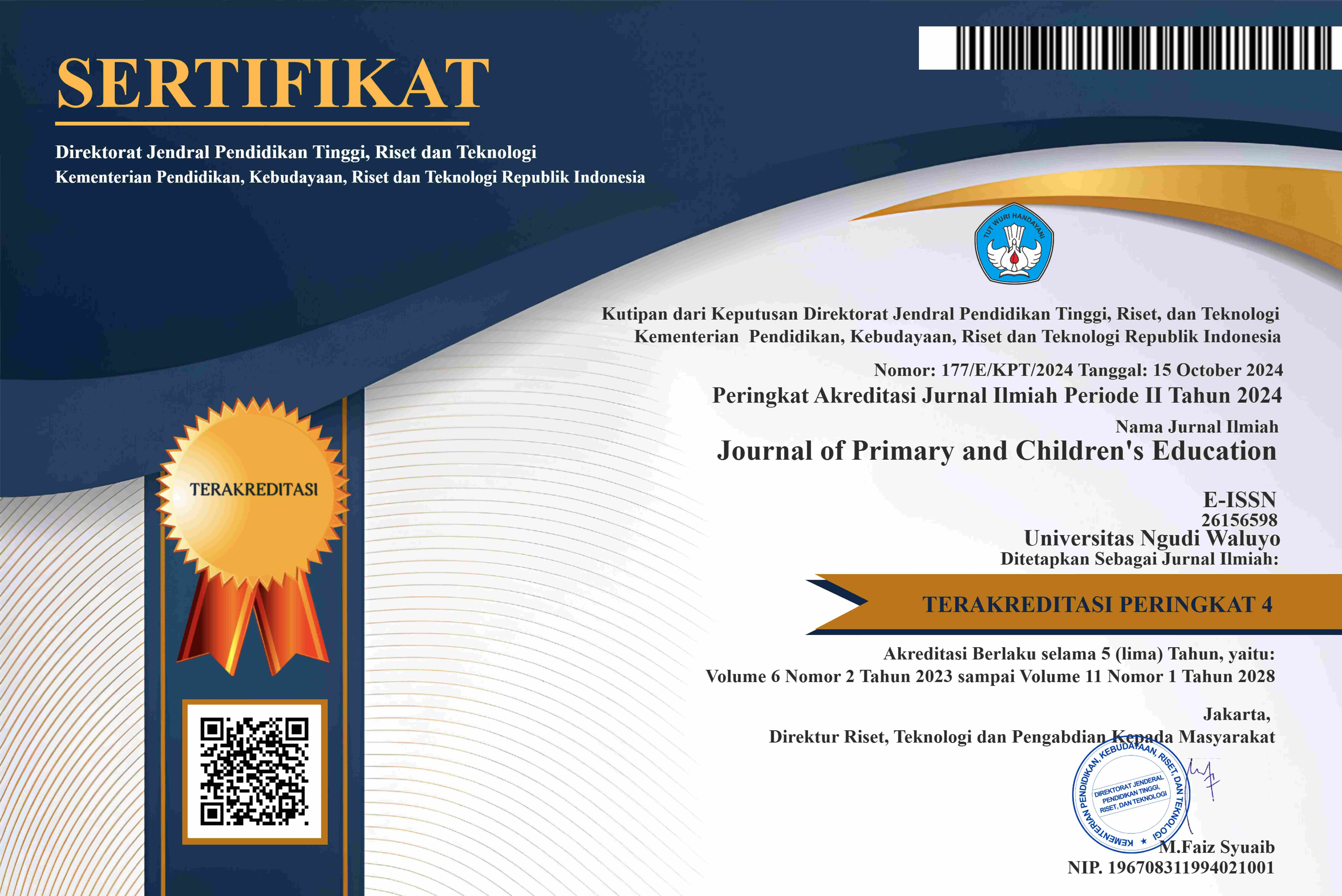PENGARUH MODEL PROBLEM BASED LEARNING BERBANTUAN PERMAINAN MONOPOLI TERHADAP KEMAMPUAN PEMECAHAN MASALAH SISWA
DOI:
https://doi.org/10.35473/jnctt.v5i1.1546Abstract
This study aims to determine the effect of the problem based learning model with the help of monopoly game learning media on the problem solving abilities of fourth grade students at SDN Jepatlor. This type of research is an experiment with a quasi-experimental method in the form of a nonequivalent control group design. The population is class IV SDN Jepatlor and the sample is class IV A as the experimental class and class IV B as the control class. The data analysis techniques used are normality test, homogeneity test and simple linear regression test. The results of this study indicate that there is an effect of using a problem based learning model with the help of a monopoly game on students' problem solving abilities. This is indicated by a significance result of 0.015 <0.05 using a simple linear regression test.
References
Araújo F. (2013). Pengembangan Media Pembelajaran Permainan Monopoli Akuntansi Untuk Meningkatkan Motivasi Belajar Siswa Kelas X Program Keahlian Akuntansi. Skripsi.
Davidi, E. I. N. (2018). Permainan Monopoli Berbasis Problem-Based Learning Untuk Meningkatkan Keterampilan Berpikir Kritis. Jurnal Pendidikan Dan Kebudayaan MISSIO, 10(1), 59–69
Desyawati, K., Goreti, M., Kristiantari, R., Agung, I. G., & Negara, O. (2021). Media Permainan Monopoli Berbasis Problem Based Learning Pada Pembelajaran Tematik di Sekolah Dasar. Jurnal Penelitian Dan Pengembangan Pendidikan, 5(2), 168–174
Dwi, I. M., Arif, H., & Sentot, K. (2013). Pengaruh Strategi Problem Based Learning Berbasis Ict Terhadap Pemahaman Konsep Dan Kemampuan Pemecahan Masalah Fisika. Jurnal Pendidikan Fisika Indonesia, 9(1), 8–17.
Indriani, M. N., & Mariani, S. (2018). The Implementation of PBL (Problem Based Learning) Model Assisted by Monopoly Game Media in Improving Critical Thinking Ability and Self Confidence. Journal of Primary Education, 200–208.
Kilroy, D. A. (2004). Problem based learning. Emergency Medicine Journal, 21(4), 411–413.
Lubis, WA, Ariswoyo, S., & Syahputra, E. (2020). Kemampuan Pemecahan Masalah Matematika Melalui Pendekatan Pendidikan Matematika Realistik dan Pendekatan Penemuan Terbimbing Berbantuan Autograph. Edumatika : Jurnal Riset Pendidikan Matematika , 3 (1), 1–12.
Putra, L. V., & Sipayung, Y. R. (2019). Peningkatan Kemampuan Pemecahan Masalah Siswa Kelas V Melalui Pembelajaran Berbasis Matematika Realistik Berbantuan Powtoon. Seminar Pendidikan Nasional, 1(1), 1–10.
Putri, R. S., Suryani, M., & Jufri, L. H. (2019). Pengaruh Penerapan Model Problem Based Learning terhadap Kemampuan Pemecahan Masalah Matematika Siswa. Mosharafa: Jurnal Pendidikan Matematika, 8(2), 331-340.
Rahaju, R., & Hartono, S. R. (2017). Pembelajaran Matematika Berbasis Permainan Monopoli Indonesia. JIPMat, 2(2).
Rahmadani, R. (2019). Metode Penerapan Model Pembelajaran Problem Based Learnig (Pbl). Lantanida Journal, 7(1), 75.
Saputro, O. A., & Rayahu, T. S. (2020). Perbedaan Pengaruh Penerapan Model Pembelajaran Project Based Learning ( Pjbl ) Dan Problem Based Learning ( Pbl ) Berbantuan Media Monopoli. Jurnal Imiah Pendidikan Dan Pembelajaran, 4(1), 185–193.
Siti Isnaeni. (2018). Peningkatan Kemampuan Pemecahan Masalah Dengan Metode Problem Solving Pada Mata Pelajaran Matematika Siswa Kelas IV Sd Negeri 2 Bumiharjo Tahun Pelajaran. Skripsi.
Sulistiowati, C. (2010). Pengaruh Permainan Ice. Skripsi. FKIP UMP, 2014. 1962, 7–29.
Published
How to Cite
Issue
Section
License
Copyright notice:
- Authors retain copyright and grant the journal right of first publication with the work simultaneously licensed under Creative Commons Attribution License that allows others to share the work with an acknowledgement of the work's authorship and initial publication in this journal.
- Authors are able to enter into separate, additional contractual arrangements for the non-exclusive distribution of the journal's published version of the work (e.g., post it to an institutional repository or publish it in a book), with an acknowledgement of its initial publication in this journal.
- Authors are permitted and encouraged to post their work online (e.g., in institutional repositories or on their website) prior to and during the submission process, as it can lead to productive exchanges, as well as earlier and greater citation of published work (The Effect of Open Access)







